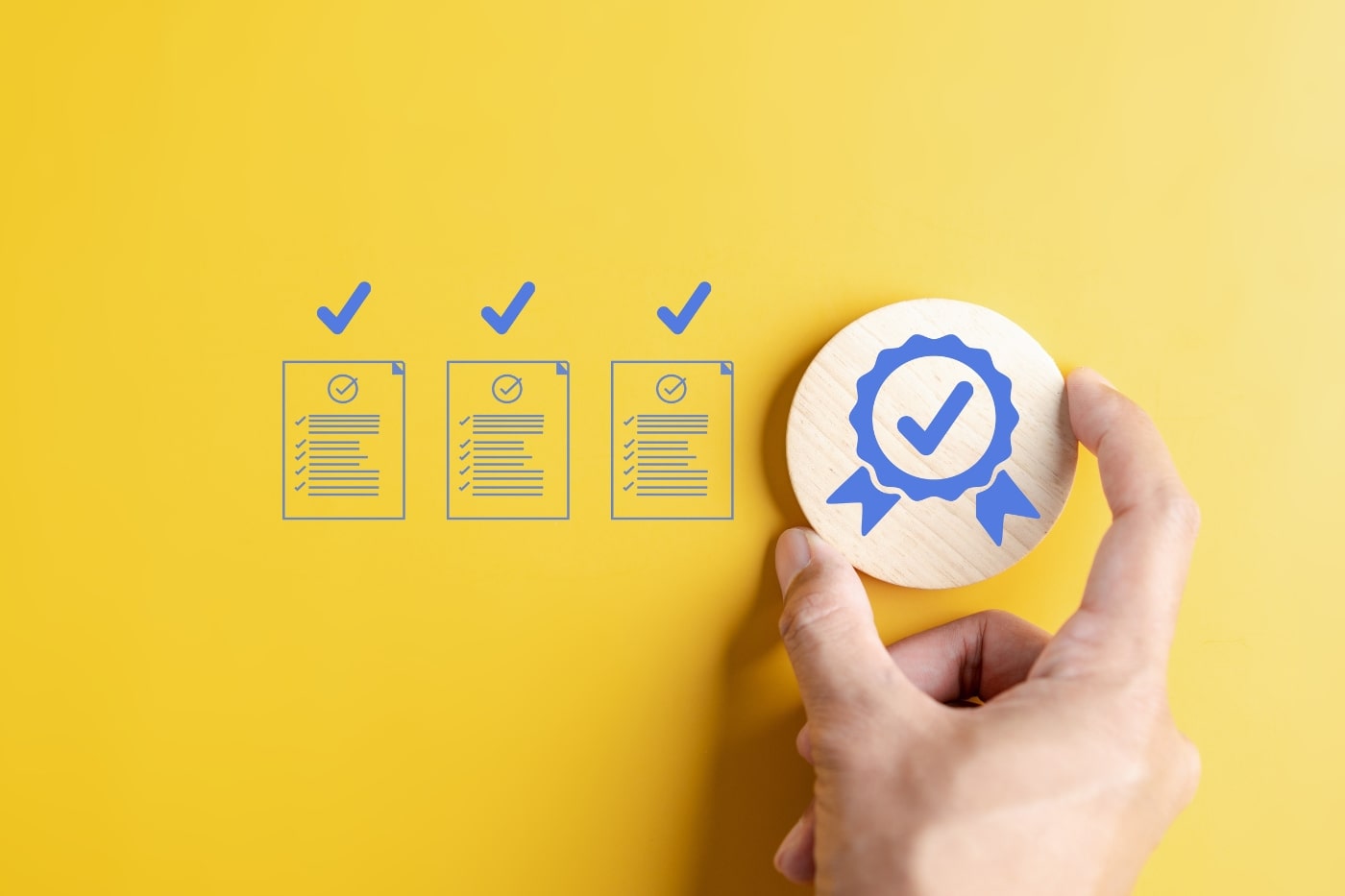5 Best Compliance Reporting Software: How to Choose?

The finance industry is replete with its own fair share of mandatory reporting requirements.
Although these reporting requirements are designed to increase transparency and make sure that companies are operating in an ethical fashion, the process of gathering and collating the necessary information tends to be a massive task.
Compliance reporting software can help your team to meet these requirements efficiently by automating many compliance oriented functions.
Here, we will take a look at some of the best compliance automation tools on the market.
Coming Up
What is Compliance Reporting Software?
What Are the Benefits of Compliance Software Reporting?
What Are the Types of Compliance?
How Does Compliance Reporting Software Work?
What Are Key Features of Compliance Reporting Software?
What is the Best Compliance Reporting Software?
How to Choose Compliance Reporting Software
Internal and External Compliance are Mission Critical Functions
What is Compliance Reporting Software?
Compliance reporting software, also known as compliance automation tools, is a suite of computerized functions run through a single, unified platform that allows the company to increase the efficiency and reliability of its compliance efforts.
This software is incredibly important to companies in financial sectors that are required to make scheduled reports to government agencies and regulators. It also allows businesses to monitor compliance within its internal functions.
The best compliance software automates the most tedious reporting functions while also offering the company’s brain trust a user-friendly option that can coordinate the efforts of multiple departments at the same time.
Simplifying the compliance process through automation allows companies to accomplish their core mission of making money, while also satisfying industry-specific regulatory requirements at the same time.
What Are the Benefits of Compliance Software Reporting?
Compliance automation tools offer the companies that use them a host of benefits that go far beyond simply meeting regulatory reporting requirements. Examples of these benefits include:
1. Transparency
By implementing finance automation software that can handle complex and mission critical finance functions, such as auditing, reconciliations and reporting, stakeholders can rest assured that processes are being run as intended and designed.
The fact that there is an automated overlay reduces the chance that human error, or worse, human impropriety, will negatively impact the finances of the company or the company’s clients.
2. Efficiency
When properly employed, risk and compliance software will automatically record a company’s most mission critical transactions. This means that decision makers, such as department managers and division heads, can concentrate their efforts on improving operations instead of worrying about how to remain in compliance with any company or industry specific rules.
It also means companies can access and gather compliance related information with the touch of a button as opposed to a frantic “all hands on deck” search through old records to compile reports before an audit deadline.
3. Redundancy
Another tremendous advantage of automated compliance software is redundancy. In many industries, companies are required to maintain transaction records for years at a time.
Using a compliance automation tool with cloud storage or remote storage capabilities means that you’ll always have a back-up source of uncorrupted data.
It also means that you will be able to continue remaining in compliance, even when accounting staff or other compliance officers are unavailable or move to different companies.
What Are the Types of Compliance?
There are several different areas of compliance that a company may be responsible for satisfying. The most obvious of these is from government regulatory agencies, who may require reporting for everything from financial transactions to health and safety records. However, governmental compliance is not the only reporting obligation a company has.
Many companies have internal compliance policies that are designed to do things like increase output and maintain brand integrity. So, in addition to any governmental requirements, individual departments may also be required to monitor their production, policies and performance to ensure that their work meets the company’s quality standards.
The best compliance software, like Solvexia, will assist companies in meeting internal company reporting requirements and external requirements set by government and regulatory agencies.
Solvexia helps to increase accuracy, maximize internal control, and ensure version control. At the same time, it is easy-to-use for anyone and grants the ability to configure rules for collecting, checking and validating data.
As a result, your business benefits from visibility, process resilience, and access to timely information.
How Does Compliance Reporting Software Work?
Compliance reporting software works by automatically tabulating or monitoring a series of designated transactions or company functions and creating a record of all those functions. In addition to recording and collating these transactions, compliance automation tools can also flag improper transactions and send alerts to the responsible parties in real time.
This allows decision makers to correct problems quickly, as opposed to thinking that everything is running according to plan and then going on a mad dash to correct a long-running problem right before a compliance audit. In fact, when compliance reporting software is working properly, proving the company’s current and historical compliance is as simple as pulling up the necessary reports from a server and forwarding them to the auditor. For example, any action performed by Solvexia’s automated software will be safely stored and secured in the event you need to run an audit report.
What Are Key Features of Compliance Reporting Software?
The volume of internal and regulatory compliance that most businesses are responsible for has turned “compliance” into an industry of its own. There are numerous regulatory compliance software vendors, who all offer automated tools to help companies stay on the right track.
With that said, the best compliance automation tools have a few key functions in common. Examples of those functions include:
1. Reporting
In many ways, reporting is the cornerstone of any compliance requirement. After all, without having to demonstrate compliance through reports, companies (or their individual departments) would basically be on the “honor” system when it comes to maintaining internal or government standards.
A good compliance tool will have a strong reporting function, both for recording compliance and alerting the proper parties to compliance issues.
2. Workflow
Compliance is not a one person, or one department job. It’s an area that every single department in a company needs to contribute equally to. So, a good compliance tool allows key personnel to delegate specific tasks to people inside the organization, set due dates and alerts.
It also integrates everyone and all the tasks in the workflow into one, unified process where everyone knows their role and where the company stands in terms of compliance at any given time.
Simultaneously, workflow automation removes key person dependencies, so you never have to worry about a process running smoothly if your personnel is out of office or calls in sick. All of these features contribute to increased internal control over key regulatory processes.
3. Risk Management
Some company tasks, such as accounting, have a high risk level in terms of the damage that can be done to the company if the tasks aren’t properly completed.
This is why a good compliance tool can identify these high-risk tasks and create a workflow specifically designed to make sure the task is properly completed. Automating this function allows the company to continue operating efficiently while also handling its most risk-sensitive functions.
4. Chain of Production/Audits
The best compliance reporting software also allows companies to create a chain of production and an audit trail for all mission critical company functions.
This audit trail will allow any concerned parties to complete their tasks and understand workflow progress without having communications spread across emails, text messages and phone calls.
It will also establish a clear chain of who did what at time so that if there is an error, it can be quickly identified and remedied.
5. Scheduling
Compliance, whether with internal policy or government regulations, is a year-round effort. That’s why high quality automated risk and compliance tools also have a calendar function that can be programmed to make sure company employees know when their particular tasks are due.
This scheduling function also allows decision makers to take a “global view” of a particular project or compliance effort and step in when necessary to speed operations up or improve compliance efforts.
What is the Best Compliance Reporting Software?
Determining what is the best compliance reporting software depends on many factors. The size of your company, the purpose of the compliance (e.g., internal, regulatory, or both), and your budget are all important considerations in determining what is the “best” compliance reporting software for you.
With that said, you can find a list of the five best compliance tools below.
1. Solvexia
Solvexia is an incredibly strong compliance tool that offers users a powerful combination of customization, AI functionality and user-friendliness. At the top of the list of benefits sits the ability to customize processes, reports, and dashboards specifically for the user’s needs.
Solvexia can be set up quickly, offering a no-code solution without any need for IT assistance. In addition to its highly functional pre-loaded dashboards, Solvexia offers a plethora of customization options, which include workflows and auditing.
Its easy-to-configure rules and submission capabilities work for XBRL, XML, text, and Excel. The software will increase your submission accuracy, ensure you meet compliance deadlines by running processes 10x faster, and ensure utmost transparency for your end-to-end processes!
Perhaps the best aspect of Solvexia is the incredibly high level of flexibility it offers. Unlike many competing tools, Solvexia can be employed equally effectively for internal or regulatory compliance.
It is also highly scalable and compatible with thousands of pre-existing technologies and datasets. Along with securing your compliance efforts, you can use Solvexia to automate many key finance responsibilities, like reconciliation, regulatory reporting, expense management, and more!
Best of all, it does this at an incredibly affordable price and offers excellent customer service.
2. ISO 134385 Quality Management
This compliance tool offers users a strong combination of value and functionality. It is very well suited for tasks such as audits, document retention, training and monitoring of suppliers. Users can access this tool’s large suite of pre-set templates and manual dashboards to create a custom compliance regime.
It also offers cloud service or a local installation option; all for a one time price of $,1460. However, there is no free version and it is only available in a limited number of countries. So, companies with international operations in places like Europe, Asia and South America may need a different tool.
3. Hyperproof
Hyperproof offers a scalable compliance tool with a wide range of preset templates that will allow almost any company to quickly get their compliance efforts up and running. These templates can be used to handle everything from testing, team workflows and evidence collection.
These functions can all be set up and stored in a cloud, which means accessing information for auditors is always straightforward. On the down side of things, some users would prefer more customization options in terms of the templates and risk management.
4. Go Audits
Go Audits is an excellent compliance tool for companies that have auditing and inspection requirements. This compliance tool features a slick mobile app that will allow integrated users to complete inspections or site audits and upload the information to a unified cloud server with the push of a button.
The analytics and reporting functions are also very strong. However, some users find that the desktop portal can be a little slow, and audits can only be deleted by someone with Go Audits.
5. Worksuite
Worksuite offers companies a strong compliance tool when it comes to organizing different departments, freelancers and service providers. This cloud-based tool can be used in locations all over the world and has a strong user interface for unifying workflow across multiple areas.
Invoicing and workforce management are both strong suits of this program, which can also integrate tax forms and other information under one umbrella. The customer service is robust, but upcharges for some functions and opaque pricing can be an issue.
How to Choose Compliance Reporting Software
Every company will have a different metric when choosing which compliance software to use, and what’s best for one company may not be best for another. So, the first factor in choosing the best compliance software for your company is analyzing what you will be using it for.
Will this tool be primarily used for internal compliance, regulatory compliance, or both?
Another important consideration is the size of your operation and how easily the non IT staff (some of whom may not be as computer savvy as others) at your company can use the tool. If your company operates internationally, some tools may not even be available in all the areas where you work.
So, this is also an important factor. Last but not least are affordability and scalability. Can you afford the tool? Does the basic tool assist you in your compliance goals? Can the tool grow with your company?
Internal and External Compliance are Mission Critical Functions
Regardless of what kind of business you are running, there will be internal compliance standards that you want that must be upheld. It’s also very likely that there will be governmental and regulatory reporting requirements that you must operate in compliance with.
One of the best ways to do that is by using compliance reporting software to assist you in managing your workflow, auditing, and satisfying reporting requirements.
With all that in mind, a compliance reports tool like Solvexia offers a powerful combination of flexibility, affordability and functionality make it a strong contender in this arena. If you think you may benefit from this powerful tool, book a free demo and see how Solvexia can help take your compliance efforts, and your business, to the next level.
FAQ
Intelligent reconciliation solution
Intelligent rebate management solution
Intelligent financial automation solution
Intelligent Financial Automation Solution
Intelligent financial automation solution
Intelligent financial automation solution
Intelligent financial automation solution
Intelligent financial automation solution
Intelligent regulatory reporting solution
Free up time and reduce errors
Recommended for you

Request a Demo
Book a 30-minute call to see how our intelligent software can give you more insights and control over your data and reporting.

Reconciliation Data Sheet
Download our data sheet to learn how to automate your reconciliations for increased accuracy, speed and control.

Regulatory Reporting Data Sheet
Download our data sheet to learn how you can prepare, validate and submit regulatory returns 10x faster with automation.

Financial Automation Data Sheet
Download our data sheet to learn how you can run your processes up to 100x faster and with 98% fewer errors.

Financial Automation Data Sheet
Download our data sheet to learn how you can run your processes up to 100x faster and with 98% fewer errors.

Financial Automation Data Sheet
Download our data sheet to learn how you can run your processes up to 100x faster and with 98% fewer errors.

Financial Automation Data Sheet
Download our data sheet to learn how you can run your processes up to 100x faster and with 98% fewer errors.

Financial Automation Data Sheet
Download our data sheet to learn how you can run your processes up to 100x faster and with 98% fewer errors.

Financial Automation Data Sheet
Download our data sheet to learn how you can run your processes up to 100x faster and with 98% fewer errors.

Rebate Management Data Sheet
Download our data sheet to learn how you can manage complex vendor and customer rebates and commission reporting at scale.

Top 10 Automation Challenges for CFOs
Learn how you can avoid and overcome the biggest challenges facing CFOs who want to automate.
.svg)



